

Marginal learning gains is inspired by the same philosophy that underpinned the extraordinary success of Team GB Cycling at the Beijing and London Olympics. The philosophy is simple: focus on doing a few small things really well.
T&L philosophy. Pedagoo London presentation. Child Led Learning. (PDF) Active Learning and Teaching Methods for Key Stages 1 and 2. Assessment for Learning: The Cramlington Teaching and Learning Model. - This issue we are looking at Assessment for Learning The quote below sums up nicely how a positive learning environment should challenge and encourage young people to move forward in their learning.
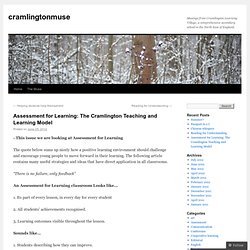
The following article contains many useful strategies and ideas that have direct application in all classrooms. “There is no failure, only feedback” An Assessment for Learning classroom Looks like… 1. 2. 3. Sounds like… 1. 2. 3. Feels like… 1. 2. 3. A Safe Environment Develop a “No put down zone” in your classroom.
No Hands Up Policy The idea behind a no hands up policy is to ensure all students are involved, and expect to be involved, in learning. Great Lessons 2: Rigour. Aiming High every day through rigour and scholarship This series of posts is about the habits of teaching; the things we do every day; the strategies and attitudes that define our default mode.
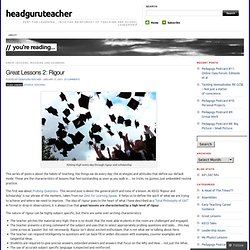
These are the characteristics of lessons that feel outstanding as soon as you walk in… no tricks, no gizmos, just embedded routine practice. The first was about Probing Questions.
TES - Log in or Register. Corsham%20Primary%20School%20-%20good%20practice%20example. ITLResearh2011Findings. Untitled. RachelOrr : Anyone used Schools Media green... Educational Technology and Mobile Learning: Top 10 Videos on 21st Century Learning. 1- Expanded Learning Opportunities 2- What is 21st Century Education 3- Educate The Heart 4- Learn to Change, Change to Learn.
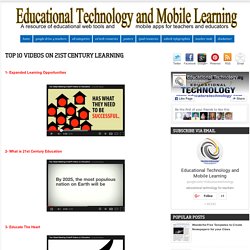
Leading 21st C learning : getting my bearings for the journey ahead… I’ve been on a fantastic professional learning journey in recent weeks: listening and talking on the conference circuit (#lfe2012 #SSATNC12, #elconf); burying my head in my tweetdeck and the library of blogs and youtube clips that follow; hosting a TeachMeet (#TMEssex); reading a couple of books and having the privilege of visiting some amazing schools.
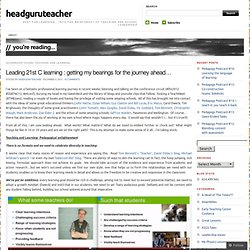
All of this has brought me into contact with the ideas of some great educational thinkers (John Hattie, Dylan Wiliam, Guy Claxton and Bill Lucas, Eric Mazur, Carol Dweck, Tim Brighouse), the thoughts of some great practitioners (John Tomsett, Alex Quigley, David Didau, Vic Goddard, Tom Bennett, Christopher Waugh, Mark Anderson, Zoe Elder..) and the ethos of some amazing schools: Saffron Walden, Passmores and Wellington. 365 days in my shoes Day 6. Personalised learning prompts for children.

What types of learning prompt do you use to support children in their learning? These two are found in every classroom in my school – they vary from year group to year group to meet differing needs and abilities. Perhaps I shall blog on that one on a future date. The last class I taught before headship was a Year 4 class with another teacher. She was the most inspirational teacher I have ever worked with. Why all of us must improve our teaching (no matter how good our school) I have been a teacher of English for 24 years, a Headteacher for 9 years and, at the age of 48, this much I know about why all of us must improve our teaching.
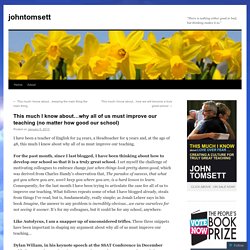
For the past month, since I last blogged, I have been thinking about how to develop our school so that it is a truly great school. I set myself the challenge of motivating colleagues to embrace change just when things look pretty damn good, which was derived from Charles Handy’s observation that, The paradox of success, that what got you where you are, won’t keep you where you are, is a hard lesson to learn. Developing oracy: it’s talkin’ time! « The Learning Spy. Talk is the sea upon which all else floats~ James Britton, Language and Learning, 1970 Students spend a lot of talking, don’t they?

Everyone can speak, so why would we want to waste valuable time teaching them to do it? Well, while all this is undoubtedly true, many students don’t speak well. This is, I hasten to add, not the same as being well spoken. This much I know about?how we teach reading skills to our weakest readers. I have been a teacher of English for 24 years, a Headteacher for 9 years and, at the age of 48, this much I know about how we teach reading skills to our weakest readers.
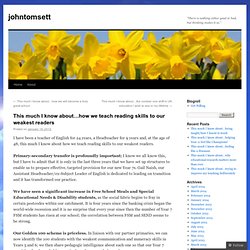
Primary-secondary transfer is profoundly important; I know we all know this, but I have to admit that it is only in the last three years that we have set up structures to enable us to prepare effective, targeted provision for our new Year 7s. Gail Naish, our Assistant Headteacher/ex-Subject Leader of English is dedicated to leading on transition and it has transformed our practice. We have seen a significant increase in Free School Meals and Special Educational Needs & Disability students, as the social fabric begins to fray in certain postcodes within our catchment. It is four years since the banking crisis began the world-wide recession and it is no surprise that every year since then the number of Year 7 FSM students has risen at our school; the correlation between FSM and SEND seems to be strong.
The Learning Arc: It takes the time it takes. The Learning Arc: Timed in minutes or hours or weeks … it all depends.
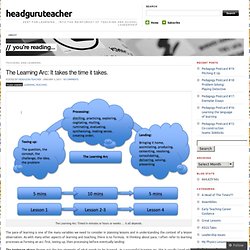
The pace of learning is one of the many variables we need to consider in planning lessons and in understanding the context of a lesson observation. As with many other aspects of learning and teaching, there is no formula. In thinking about pace, I often refer to learning processes as forming an arc: first, teeing up, then processing before eventually landing: The teeing-up phase throws out the key elements of what needs to be learned. In a successful learning arc, this is usually laced with intrinsic incentives to sustain learners through the journey ahead. The processing phase is where learners battle through the struggle as their brains make all the necessary connections. Outstanding teaching & learning: missed opportunities and marginal gains.
I work at an ‘outstanding’ school where the teaching and learning is ‘good’. As such we are squarely in Wilshaw’s sights and almost certainly due an inspection at some point this year. We were last inspected in November 2011 but a lot of goal post moving has gone on in the intervening months. The new inspection framework is widely seen as a ravening beast out to devour schools that are not delivering to the lofty standards of our hero, the saviour of Mossbourne Academy. In essence, what this means is that if we want to retain the right to put ‘outstanding’ on our headed paper we’d better be able to demonstrate that our T&L has improved since last year.
Has it? Clearly this needs to be challenged but not by wielding a stick or telling teachers to try harder. Outstanding teaching using the new #Ofsted framework « @ TeacherToolkit. Firstly, this is not a model, just an experience… Ofsted background: …Throughout my teaching career, I’ve been part of 5 Ofsted inspections, dating back to 1997 as a class teacher, and most recently in 2011, my second as a senior teacher… When starting my current school, Oftsed had departed the day before!
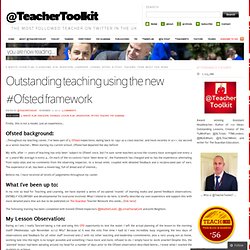
My wife, after 11 years of teaching has only been ‘subject to Ofsted’ once, but I’m sure some teachers across the country have averaged one every 2 or 3 years! My average is every 4… On each of the occasions I have ‘been done to’, the framework has changed and so has the experience; alternating from reply-slips and no-comments from the observing inspector, to a broad smile, coupled with detailed feedback and a reciprocated pair of ears. The experience in all, has been a mixed-bag, full of dread and of interest…